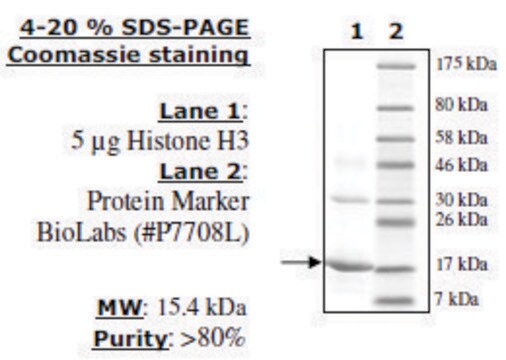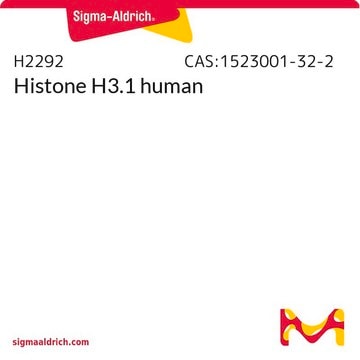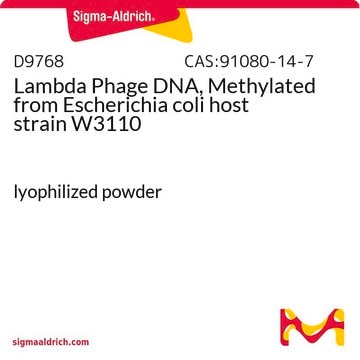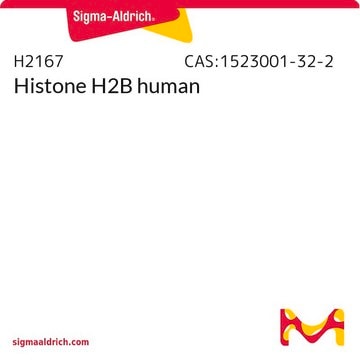10223565001
Roche
Histone
from calf thymus
Sinónimos:
histone
Iniciar sesiónpara Ver la Fijación de precios por contrato y de la organización
About This Item
UNSPSC Code:
12352204
Productos recomendados
Quality Level
form
lyophilized
packaging
pkg of 10 mg
manufacturer/tradename
Roche
shipped in
wet ice
storage temp.
2-8°C
Categorías relacionadas
General description
Mixture of histones H1, H2A, H2B, H3, and H4, isolated from calf thymus.
Histones are a group of DNA-binding proteins that are characterized by relatively high levels of lysine and arginine. Five different fractions of histones have been isolated and characterized. These are named as H1, H2A, H2B, H3 and H4. The H1 fraction is lysine-rich, while the H2A and H2B are slightly lysine-rich, The H3 and H4 fractions are arginine-rich. The molecular weights of histones are approximately 11 to 21 kDa depending on the fraction.
Histones are a group of DNA-binding proteins that are characterized by relatively high levels of lysine and arginine. Five different fractions of histones have been isolated and characterized. These are named as H1, H2A, H2B, H3 and H4. The H1 fraction is lysine-rich, while the H2A and H2B are slightly lysine-rich, The H3 and H4 fractions are arginine-rich. The molecular weights of histones are approximately 11 to 21 kDa depending on the fraction.
Application
Histone from calf thymus has been used:
- in in vitro kinase assay to check the phosphorylation of histones by protein kinase A.
- to check the in vitro methyltransferase activity of protein argininemethyltransferases from Oryza sativa (OsPRMTs).
- in anti-histone ELISA.
Biochem/physiol Actions
Histones have an important role in the organization and modification of chromatin. The nucleosome is the basic unit of the chromatin. It is made up of two molecules each of histones H2A, H2B, H3 and H4, wrapped with approximately 146bp of DNA. Histone H1 binds to the nucleosomes at the DNA entry and exit points and stabilizes them.
Physical form
Lyophilizate (natural mixture of histones H1, H2A, H2B, H3, and H4).
Preparation Note
Working concentration: 1 to 5 mg/ml.
Working solution: Recommended solvent is double-distilled water.
Storage conditions (working solution): Aqueous solution is stable at -15 to -25 °C for several months.
Avoid repeated freezing and thawing!
Working solution: Recommended solvent is double-distilled water.
Storage conditions (working solution): Aqueous solution is stable at -15 to -25 °C for several months.
Avoid repeated freezing and thawing!
Other Notes
For life science research only. Not for use in diagnostic procedures.
Storage Class
11 - Combustible Solids
wgk_germany
WGK 1
flash_point_f
Not applicable
flash_point_c
Not applicable
Certificados de análisis (COA)
Busque Certificados de análisis (COA) introduciendo el número de lote del producto. Los números de lote se encuentran en la etiqueta del producto después de las palabras «Lot» o «Batch»
¿Ya tiene este producto?
Encuentre la documentación para los productos que ha comprado recientemente en la Biblioteca de documentos.
Los clientes también vieron
Ona Bloom et al.
Proceedings of the National Academy of Sciences of the United States of America, 108(25), 10255-10259 (2011-06-08)
Systemic lupus erythematosus (SLE) is a chronic autoimmune disease characterized by the presence of pathogenic autoantibodies, many of which are directed against nuclear antigens, in particular double-stranded (ds) DNA. Both clinical studies and animal models have shown that anti-dsDNA antibodies
H1 histone and the condensation of chromatin and DNA.
R D Cole et al.
Cold Spring Harbor symposia on quantitative biology, 42 Pt 1, 253-263 (1978-01-01)
Abinaya Rajendran et al.
Biochemistry, 59(2), 183-196 (2019-09-04)
The metabolic serine hydrolase family is, arguably, one of the largest functional enzyme classes in mammals, including humans, comprising 1-2% of the total proteome. This enzyme family uses a conserved nucleophilic serine residue in the active site to perform diverse
Nicole Happel et al.
Gene, 431(1-2), 1-12 (2008-12-09)
The lysine-rich H1 histone family in mammals includes eleven different subtypes, and thus it is the most divergent class of histone proteins. The central globular H1 domain asymmetrically interacts with DNA at the exit or entry end of the nucleosomal
Evgeny A Ermakov et al.
International journal of molecular sciences, 21(19) (2020-10-04)
Schizophrenia is known to be accompanied not only with an imbalance in the neurotransmitter systems but also with immune system dysregulation and chronic low-grade inflammation. Extracellular histones and nucleosomes as damage-associated molecular patterns (DAMPs) trigger systemic inflammatory and toxic reactions
Nuestro equipo de científicos tiene experiencia en todas las áreas de investigación: Ciencias de la vida, Ciencia de los materiales, Síntesis química, Cromatografía, Analítica y muchas otras.
Póngase en contacto con el Servicio técnico










